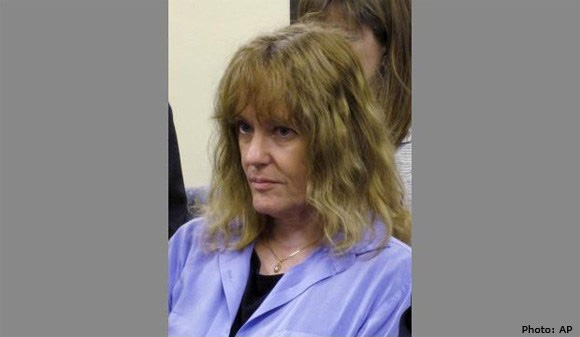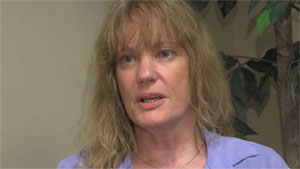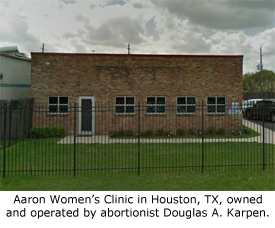
By Cheryl Sullenger
Topeka, KS – A case that extraordinarily began nearly fourteen years ago may have finally reached its conclusion, according to court documents recently obtained by Operation Rescue.
Shawnee County Court Judge Franklin Theis issued a judgement that upheld a January 2019 license revocation order issued by the Kansas Board of Healing Arts against abortionist Ann Kristin Neuhaus.
While that sounds relatively routine, the Neuhaus case was anything but.
To understand why, it requires a quick look 25 years into the past.
Neuhaus once operated her own abortion business in Lawrence, Kansas, then traveled to Wichita in the late 1990’s to conduct abortions at Central Women’s Services. (Ironically, that location was purchased by Operation Rescue in June 2006, which forced the abortion business was to close. It now serves as Operation Rescue’s national headquarters.)
Neuhaus came under Board discipline in 1999 and again in 2001 for medical abuses, which included an allegation of a forced abortion after a woman had withdrawn her consent, shoddy record-keeping, and lack of proper patient care. The KSBHA declared at that time that Neuhaus was a “danger to the public” and limited her ability to practice medicine.
At that time, Neuhaus stopped doing abortions at Central Women’s Services, then closed her Lawrence abortion clinic in 2002.
According to court testimony in another related case, it was learned that after her 2001 discipline, former Kansas Board of Healing Arts Executive Director Larry Buening, an appointee of former pro-abortion Democrat Gov. Kathleen Sebelius, understood that Neuhaus was desperate for money. He approached his close personal friend, George Tiller, who then owned and operated Women’s Health Care Services in Wichita, which was known as the largest late-term abortion facility outside Communist China.
At that time, Kansas law banned late-term abortions past 22 weeks gestation, a developmental milestone recognized as viability in Kansas Law. Narrow exceptions to the law included if the woman’s life was in danger, or if the pregnancy would cause a substantial and irreversible impairment of a major bodily function of the pregnant woman. An opinion issued by a previous State Attorney General, Carla Stoval, also a known abortion supporter, allowed mental health risks to be included as a “major bodily function” under the law, but only if the risk was “substantial and irreversible.”
The law also required that a second physician who was unaffiliated with the person conducting the abortion had to agree that the abortion was medically necessary. [Note: It is Operation Rescue’s position that no abortion is medically necessary.]
Buening knew that Tiller was in need of a new person to sign off on his late-term abortions. Buening recommended Tiller use Neuhaus to provide his second referrals due to her financial needs. Buening promised that if Tiller did this, his problems concerning meeting the law would “go away.” When later questioned about this arrangement, Buening denied the conversation took place. He later resigned.
In October 2006, Operation Rescue learned that Tiller had an arrangement to use only Neuhaus to provide the late-term referrals, and that the money she earned from her work at WHCS in Wichita was her only income. That month, Operation Rescue lodged a complaint with the Kansas Board of Healing Arts against Tiller and Neuhaus for violations for having an improper affiliation with WHCS. That started a Board investigation into both Tiller and Neuhaus.
“Once we realized that Neuhaus was the only person signing off on these post-viability abortions, we knew that the law was being broken,” said Troy Newman, President of Operation Rescue. “The investigation seemed like it took forever, but that was nothing compared to the years of litigation that followed.”
In 2009, the KSBHA announced it had filed an 11-count disciplinary petition against Tiller based on Operation Rescue’s complaint. Soon after that, Tiller died and his clinic was closed.
“We thought that was the end of the matter,” said Newman. “We were surprised when found out the KSBHA was seeking disciplinary action against Neuhaus as well.”
On July 21, 2010, nearly four years after the initial complaint was filed, Operation Rescue was notified that the KSBHA had filed an eleven-count petition against Neuhaus for having an improper affiliation with the owner of Women’s Health Care Services, George Tiller, and for providing shoddy mental health diagnoses that led to post-viability abortions on eleven minor girls who ranged in age from 10 to 18 years old.
A disciplinary hearing was held in September 2011, in which it was revealed that Neuhaus used mental health exceptions to justify all post-viability abortions at WHCS. She used a teaching program called “Psych Manager Lite” to reach her mental health diagnoses. She would enter yes or no answers to questions in the program such as inquiries about weight gain or loss and whether the women were sleeping well at night (symptoms experienced by all women in their third trimesters of pregnancy). The program would then calculate the answers and conclude a diagnosis.
In order to meet the requirements of the law, the diagnosed conditions had to be substantial and irreversible. They were not.
Chart NeuhausPatients2 by Cheryl Sullenger on Scribd
An expert witness testified that she believed that using the teaching program to reach mental health diagnoses along with inadequate record-keeping violated the standard of care.
Neuhaus was known to kept notoriously poor records on the women she interviewed. Sometimes, when Neuhaus could not make it to Wichita from her home near Lawrence, she would conduct interviews over the phone and conclude long-distance that the women suffered mental health disturbances. In some cases, there was no evidence that she ever spoke to the woman at all.
On February 20, 2012, administrative judge who heard the case recommended that Neuhaus’ license be revoked. The KSBHA complied wit that recommendation.
Normally, that would have been the end of the case.
However, Neuhaus appealed to a Shawnee County Court, which overturned the cause of action that asserted Neuhaus violated the standard of care in diagnosing the minors with dubious mental health disorders. The judge ordered KSBHA to issue new discipline based only on record-keeping violations.
The KSBHA issued a second revocation order in December 2014, which Neuhaus also appealed successfully.
For the third time, the KSBHA again revoked Neuhaus’ medical license on July 7, 2017, and for the third time, Neuhaus appealed. Judge Franklin Theis, who had heard the case since the first appeal was filed in 2011, again remanded the case back to the KSBHA for new discipline
The KSBHA understood that Neuhaus was defiant and resistant to Board oversight. She showed no remorse. The Board determined that testimony she had given was simply not credible, and any attempts at further rehabilitation were useless.
The KSBHA displayed an admirable will to protect the public, and never wavered throughout the long years of litigation. In January 2019, it revoked Neuhaus’ medical license for a fourth time in a voluminous 83-page final order.
Again, Neuhaus appealed, but this time the outcome was different. In July 2019, Judge Theis finally upheld the revocation order in his 38-page ruling against Neuhaus. It was the first time Theis had ever ruled against her.
“We are extremely relieved that Neuhaus will not be allowed to get her license back and will never be able to conduct another abortion. That means women and their babies will continue to be spared from Neuhaus’ shoddy practices,” said Newman. “Neuhaus’ arrogant and defiant attitude made her a danger to the public and was ultimately her undoing. She always acted as though her status as an abortionist placed her above the law. It took 14 years to prove she was wrong.”




